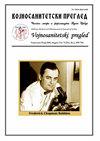Increased concentration of tumour necrosis factor alpha in the plasma of glaucoma patients
IF 0.2
4区 医学
Q4 MEDICINE, GENERAL & INTERNAL
引用次数: 0
Abstract
Background/Aim. Changes in the concentration of various mediators of inflammation and immune response in blood, aqueous humor, or eye tissues support the theory of inflammation and immune system activity in the pathogenesis of openangle glaucoma. Inflammatory biomarkers have a great potential for application in clinical practice. We investigated the plasma concentrations of tumor necrosis factor alpha (TNF-?) in patients with open-angle glaucoma and controls without glaucoma, and examined a correlation between plasma TNF-? levels in glaucoma patients and their clinical parameters. Methods. The present study included 87 participants (87 eyes) divided into three groups: 35 subjects (35 eyes) with primary open-angle glaucoma with elevated intraocular pressure - hypertension glaucoma (POAG-HTG), 23 subjects (23 eyes) with pseudoexfoliative open-angle glaucoma (XFG), and 29 subjects in the control group matched with the patient groups in terms of age and sex. We performed a complete clinical examination including standard automated perimetry and determination of changes in the participant's repeated visual field, and optical coherence tomography and determination of retinal peripapillary nerve fiber thickness (RNFL). The concentration of circulating TNF-? in participants? plasma was measured using commercial immunoadsorption enzyme tests (ELISA). Results. The concentrations of TNF-? in the plasma of glaucoma patients (POAG-HTG 2.04?1.98 pg/mL and XFG 2.05?1.48 pg/mL) were significantly higher than in healthy subjects (1.43?2.00 pg/mL, p<0.05). No statistically significant correlations of TNF-? concentration with any of the clinical parameters including IOP, C/D, MD, RNFL Avg, RNFL Sup and RNFL Inf were found in any of the groups of patients with glaucoma. Conclusion. The concentration of the pro-inflammatory cytokine, TNF-?, in the plasma is significantly higher in glaucoma patients compared to nonglaucomatous subjects, and confirms the role of the inflammation in the pathogenesis of glaucoma, as one of noninflammatory ocular diseases. The plasma concentration of TNF-? does not correlate with any of the examined clinical parameters; hence, it cannot be considered a measure of progression and damage in glaucoma.青光眼患者血浆中肿瘤坏死因子α浓度升高
背景/目的。血液、房水或眼组织中各种炎症和免疫反应介质浓度的变化支持炎症和免疫系统活性在开角型青光眼发病机制中的理论。炎症生物标志物在临床实践中具有很大的应用潜力。我们研究了开角型青光眼患者和非青光眼对照组的血浆肿瘤坏死因子α (TNF-?)浓度,并检测了血浆TNF-?青光眼患者的水平及其临床参数。方法。本研究共纳入87例受试者(87只眼),分为3组:原发性开角型青光眼伴高眼压-高血压青光眼(POAG-HTG) 35例(35只眼),假性剥脱性开角型青光眼(XFG) 23例(23只眼),对照组29例(年龄和性别与患者组相匹配)。我们进行了完整的临床检查,包括标准的自动视野检查和确定参与者重复视野的变化,光学相干断层扫描和确定视网膜乳头周围神经纤维厚度(RNFL)。循环TNF-?在参与者吗?采用商业免疫吸附酶试验(ELISA)测定血浆。结果。TNF-?青光眼患者血浆中POAG-HTG (2.04 ~ 1.98 pg/mL)和XFG (2.05 ~ 1.48 pg/mL)显著高于健康人(1.43 ~ 2.00 pg/mL, p < 0.05)。TNF-?每组青光眼患者的IOP、C/D、MD、RNFL Avg、RNFL Sup、RNFL Inf等临床参数的浓度均不一致。结论。促炎细胞因子TNF-?在青光眼患者血浆中,与非青光眼受试者相比,其血浆中含量明显增高,证实了炎症在青光眼发病机制中的作用,作为非炎症性眼部疾病之一。血浆中TNF-?与检查的任何临床参数无关;因此,它不能被认为是青光眼进展和损害的衡量标准。
本文章由计算机程序翻译,如有差异,请以英文原文为准。
求助全文
约1分钟内获得全文
求助全文
来源期刊

Vojnosanitetski pregled
MEDICINE, GENERAL & INTERNAL-
CiteScore
0.50
自引率
0.00%
发文量
161
审稿时长
3-8 weeks
期刊介绍:
Vojnosanitetski pregled (VSP) is a leading medical journal of physicians and pharmacists of the Serbian Army. The Journal is published monthly.
 求助内容:
求助内容: 应助结果提醒方式:
应助结果提醒方式:


